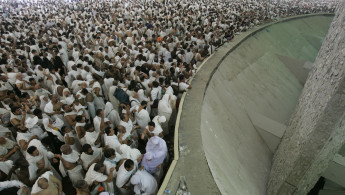Saudi Arabia tightens security measures ahead of hajj pilgrimage
Saudi authorities will impose tighter measures on an Islamic 'devil stoning' ritual in Mecca which led to the deaths of some 2,300 people during last year's hajj pilgrimage in the kingdom, Saudi newspapers reported on Wednesday.
Officials will reduce the period in which pilgrims can perform the Jamarat ritual to 12 hours, the Saudi Gazette and Arab News said, noting it will still be performed over three days starting from September 11.
The Jamarat – three large blocks of stones that represent the devil - located at Mina, about five kilometres (three miles) east of Mecca's Grand Mosque, will be closed from 6:00 to 10:30 am on the first day, from 2:00 to 6:00 pm on the second day and from 10:30 am to 2:00 pm on the final day, the hajj ministry said.
"This procedure will enable the pilgrims to throw stones easily and will prevent any stampede that may result from overcrowding," the Saudi Gazette quoted ministry undersecretary Hussain al-Sharif as saying.
Authorities also imposed new restrictions on pilgrims circumambulating around the holy Kaaba, stating the ritual can only be performed one hour before or after regular prayers when they begin their hajj, Saudi Gazette and Arab News said.
 |
Last month, officials said Muslim pilgrims joining this year's hajj in Saudi Arabia will have to wear an electronic safety bracelet. |  |
Last month, officials said Muslim pilgrims joining this year's hajj in Saudi Arabia will have to wear an electronic safety bracelet.
The high-tech safety measure will help authorities provide care "and identify people", the Arab News and Saudi Gazette reported.
The bracelets are water resistant, connected to a GPS location system, and store each pilgrim's personal information including address and medical records, the newspapers said.
At least 2,297 pilgrims died during the stampede on September 24 during last year's hajj, according to data from foreign officials, some of whom expressed concerns about difficulty in identifying the victims.
Saudi Arabia issued a death toll of 769.
It was the worst disaster in the history of Islam’s hajj history.
Crown Prince Mohammed bin Nayef, the interior minister who also chairs the hajj committee, ordered a probe immediately after the stampede disaster last year but there has been no word on its findings.
The tragedy happened as pilgrims made their way in searing temperatures to the Jamarat site in Mina.
The hajj and lesser umrah pilgrimages bring millions of Muslims to Saudi Arabia every year.





 Follow the Middle East's top stories in English at The New Arab on Google News
Follow the Middle East's top stories in English at The New Arab on Google News
![The UAE is widely suspected of arming the RSF militia [Getty]](/sites/default/files/styles/image_330x185/public/2024-11/GettyImages-472529908.jpg?h=69f2b9d0&itok=Yauw3YTG)
![Netanyahu furiously denounced the ICC [Getty]](/sites/default/files/styles/image_330x185/public/2024-11/GettyImages-2169352575.jpg?h=199d8c1f&itok=-vRiruf5)
![Both Hamas and the Palestinian Authority welcomed the ICC arrest warrants [Getty]](/sites/default/files/styles/image_330x185/public/2024-11/GettyImages-2178351173.jpg?h=199d8c1f&itok=TV858iVg)